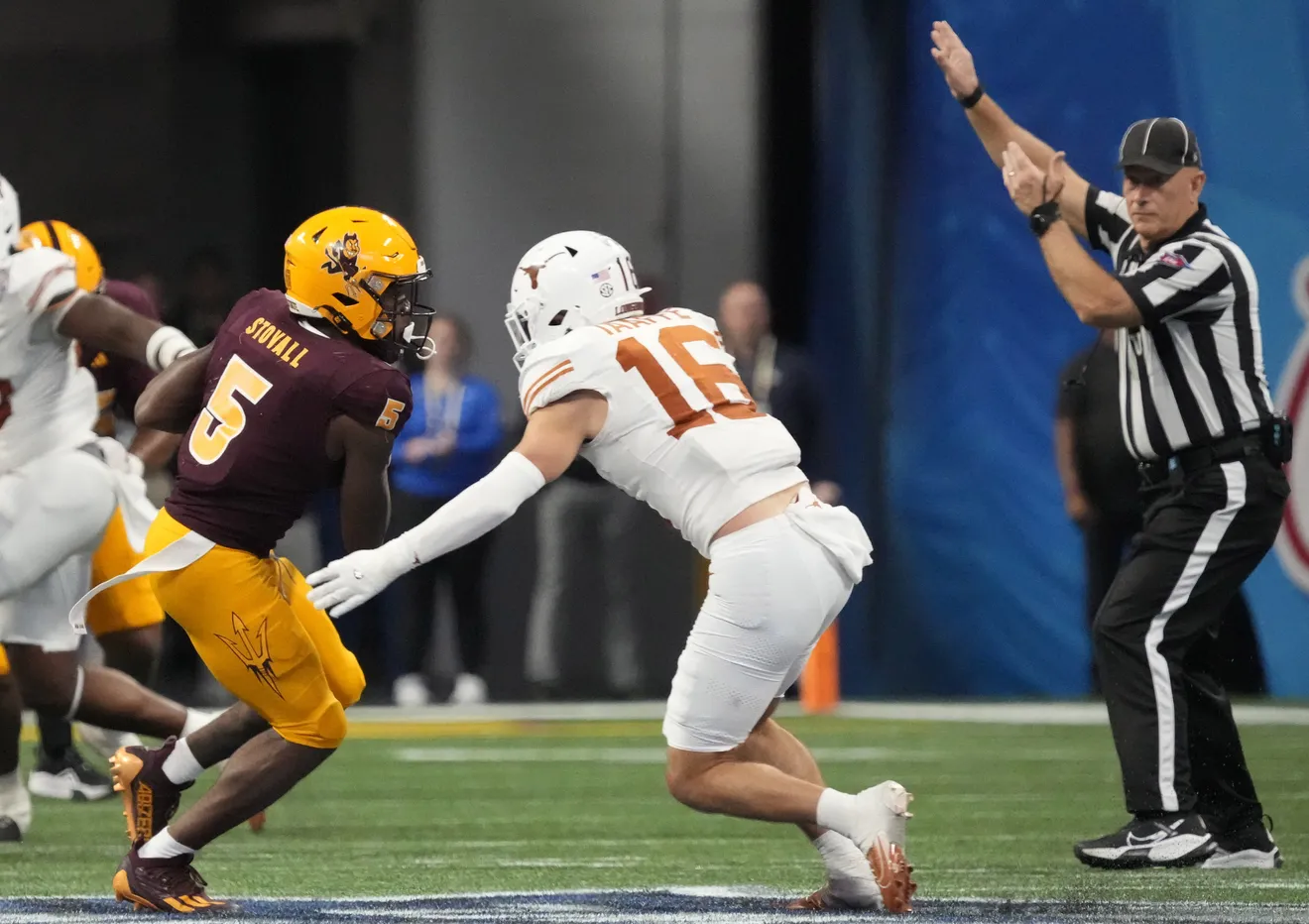The College Football Playoff Peach Bowl clash between Arizona State University (ASU) and the University of Texas has become a lightning rod for controversy following a critical targeting non-call that many argue altered the outcome of the game. The matchup, held in Atlanta, ended with Texas edging out ASU in a dramatic 39-31 double-overtime victory. However, the post-game conversation has been dominated by debates over officiating and its impact on the result.
The Controversial Play
The pivotal moment occurred late in the fourth quarter as ASU wide receiver Melquan Stovall attempted to catch a pass. Texas defensive back Michael Taaffe delivered a helmet-to-helmet hit, a play that immediately drew attention for potential targeting. Under NCAA rules, targeting is defined as forcible contact to the head or neck area of a defenseless player or using the crown of the helmet to initiate contact.
Officials paused the game to review the hit, with many fans and analysts expecting a targeting penalty. Such a call would have resulted in an automatic first down for ASU deep in Texas territory, potentially enabling the Sun Devils to secure a game-winning score. Instead, the officiating crew ruled that the hit did not meet the criteria for targeting, forcing ASU to punt and setting the stage for Texas to take the game into overtime.
Pat McAfee’s Reaction
ESPN analyst and former NFL punter Pat McAfee was among the most vocal critics of the non-call. During his show, McAfee praised ASU’s resilience under first-year head coach Kenny Dillingham but lamented the officiating decision that he believes cost the Sun Devils the game.
“They [ASU] came out, put up a fight against Texas—almost win that game. Should’ve won that game… That’s game over. That’s first down. That’s game over—unless it’s not called,” McAfee said, reflecting the sentiments of many ASU fans who felt robbed of a potential upset victory.
Broader Criticism and Expert Opinions
The targeting non-call has drawn widespread criticism not only from fans but also from football analysts and former officials. Terry McAuley, a former NFL referee and NBC rules analyst, weighed in on the controversy, questioning the decision to let the play stand without a penalty. The debate centers around the subjective interpretation of the targeting rule, which is designed to protect players from dangerous helmet-to-helmet collisions.
Critics argue that inconsistencies in officiating undermine the credibility of the targeting rule, particularly in high-stakes games. The Peach Bowl’s outcome has reignited calls for clearer guidelines and more consistent enforcement of the rule to ensure player safety and fairness.
Impact on Arizona State
For ASU, the targeting controversy overshadowed what was otherwise a commendable performance. The Sun Devils, who entered the Peach Bowl as heavy underdogs, delivered a spirited performance that pushed Texas, a perennial powerhouse, to the brink of defeat. First-year head coach Kenny Dillingham’s leadership has been widely praised, with many viewing the season as a turning point for the program.
Despite the loss, the Sun Devils’ performance in the Peach Bowl has set the stage for optimism about the future. “This team has shown resilience and heart all season,” Dillingham said in a post-game interview. “We’re going to build on this and come back stronger.”
Texas Holds On
While the controversy dominated headlines, Texas capitalized on the non-call and demonstrated why they are considered one of the nation’s top teams. The Longhorns, led by their high-powered offense, delivered clutch plays in overtime to seal the win. The victory propelled Texas into the College Football Playoff Championship game, but not without questions about how much the non-call influenced their path.
Looking Ahead
The targeting debate has broader implications for college football. Many are calling for the NCAA to review and refine the targeting rule to ensure consistency in its application. Some have even suggested implementing independent officiating reviews for playoff games to reduce the potential for errors in critical moments.
For ASU, the focus now shifts to the offseason and building on the progress made under Dillingham’s leadership. Despite the disappointing finish, the Sun Devils have laid a foundation for future success.
The Peach Bowl will be remembered as much for its thrilling double-overtime finish as for the officiating controversy that marred its conclusion. As college football fans look ahead to the championship game, the debate over targeting and its role in shaping outcomes remains a hot topic.

